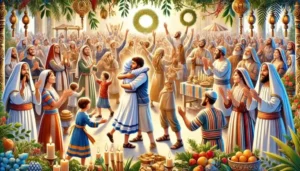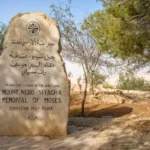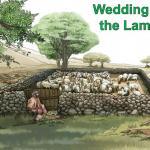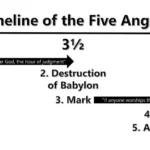Last Updated on December 14, 2024 by Steve
A good question
One of my readers posted the question, “If the rapture is at the end after the tribulation period then what is the point of the rapture if it is not to provide a way of escape to the suffering and persecution?” That is a good question and one that I think needs answering using a blog and a suitable explanation.
The purpose of the rapture is not to escape tribulation
I think one of the biggest misunderstandings of the purpose of the rapture is thinking that it is a means of escape from the suffering, persecution, and judgment of the seven year tribulation period. Nowhere in the Bible does it link the two concepts.
Purpose 1: Relief after not before persecution
One purpose of the rapture is to give relief from the suffering and persecution after seven years not to escape the suffering and persecution before it happens. The proof for this comes in 2 Thessalonians where Paul specifically applies to the church and says this, “…you will be counted worthy of the kingdom of God, for which you are suffering. He will…give relief to you who are troubled… …This will happen when the Lord Jesus is revealed (revelation of Jesus Christ) from heaven in blazing fire with his powerful angels.”1 The relief comes to Christians who have been suffering and the relief is specifically and finally the rapture. And when does this relief occur? At the apocalypse or revelation of Jesus Christ when he comes in glory with his angels—just before the Day of the Lord right at the end after the tribulation period. In 2 Thessalonians, Paul links the gathering or assembling of the believers, which is the rapture, with the Day of the Lord. This was because there was some confusion amongst the Thessalonian believers as there is with the church today.2 Paul says that they occur basically at the same time. In fact, if you listen to the message #6 on the Feast of Trumpets in my “Feast of God” series you will hear that the rapture occurs just ten days before the Day of Atonement when Christ returns in glory to defeat the devil and his beast.
This is a huge error of thinking made by Christians—that God would never allow his children to suffer from persecution. And it all comes from one verse, “For God did not appoint us to suffer wrath but to receive salvation through our Lord Jesus Christ.”3 The error made by many is thinking that the seven year tribulation period is a period of the wrath of God. God’s wrath and the tribulation are two different things. The Book of Revelation is clear that God’s wrath (fury) does not occur until after the 6th seal judgment when the sun turns black and the moon turns blood red.4 But in Matthew it says that the sun is darkened and the moon will not give its light until after the tribulation.5 Therefore by simple logic, one can deduce that God’s wrath does not occur until after the tribulation. Most Christians are taught by the books they read and by certain pastors that tribulation and wrath are the same thing. Tribulation does not equal God’s wrath. The word “tribulation” occurs 22 times in the New Testament but nowhere does this word occur with the words “pre” or “rapture”. So if the concept of a pre-tribulation rapture is so important it would be reasonable to assume that the phrase “pre-tribulation rapture” would occur at least once in those 22 times in those verses. But conversely, the phrase “after the tribulation” does occur in v. 29 and then two verses later in v. 31 we see the concept of the rapture, if not the word itself, where Matthew uses the words, gather the elect, angels, loud trumpet call, ends of the earth.6 To use a well-used cliche, if it sounds like the rapture, looks like the rapture, feels like the rapture, smells like the rapture then most likely it is talking about the rapture.
Purpose 2: To greet the coming king as he arrives
Well-renowned pastor and theologian John Piper gives a second purpose for the rapture…
The word for “meeting” the Lord in the air in 1 Thessalonians 4:17 (apantesin) is used in two other places in the New Testament: Matthew 25:6 and Acts 28:15. In both places, it refers to a meeting in which people go out to meet a dignitary and then accompany him into the place from which they came out. One of these, Matthew 25:6, is even a parable of the second coming and so a strong argument that this is the sense of the meeting here in 1 Thess. 4:17—that we rise to meet the Lord in the air and then welcome him to earth as king.
It seems reasonable to conclude that raptured Christians will welcome the coming king as He wraps up His victory ten days later and defeats the beast and false prophet and their army on the Day of Atonement. Indeed we will be witnesses to this whole spectacular event and the power and glory of God. We will have front row seats as His children with the angels.
Furthermore, the Translator’s Handbook which I extensively use as a Bible Translator says of the word “meet”:
The word translated "meet" is an unusual one. In secular Greek, it is used in referring to ceremonies held on the occasion of a state visit, and especially to the inauguration of a ruler or important official. But the idea of going out to meet God is also found in the Old Testament.7 The general idea is that of a solemn, not a casual or accidental, meeting. For some languages, the appropriate connotations of a word translating meet may be contained in a term suggesting 'to greet the Lord in the sky', or 'to gather around the Lord in the sky'.
So a second purpose of the rapture is to bring in and greet the coming king as He comes. It is not a secret, pre-tribulational greeting but a spectacular welcome by His children as He comes to wrap up the course of history as we know it.
Conclusion
In conclusion, the tribulation and believers are not mutually exclusive. Believers going through tribulation and persecution is not contrary to Biblical teaching. History tells us that we have seen it occur many times. Pre-trib, mid-trib, and pre-wrath theories all assume that the purpose of the rapture is to evacuate believers before the rough stuff happens because they equate tribulation with God’s wrath. But believers are not immune from judgment as Peter says in 1 Peter 4:17…
However, if you are suffering as a Christian, do not be ashamed, but praise God that you bear the name of Christ. For now, is the time for judgment to begin with the household of God. And if it begins with us, what will be the outcome for those who do not obey the gospel of God?
Judgment begins with the household of God. And when that seven year period ends, relief will come then and not before.
The purpose of the rapture is at least twofold: to give relief to the “elect” who have been suffering through the last half; secondly to greet the coming king as he enters into the final scene. Find out who the elect are in the post, “Who are the elect in the Olivet Discourse?“
Of course, the Bible does tell us that we can avoid that final 3 ½ year period of suffering if we escape to the safe place. That is entirely up to us. And as this picture above shows us of the gathering eagles—that will be the sign of where that final rapture gathering will take place—where the dead body is. And I believe that the evidence tells us that the corpse referred to is the dead body of Moses on Mt. Nebo. At this final end-times scene, on the Jewish New Year on the Feast of Trumpets, angels will gather the elect from the four corners of the earth and together with the woman who is already in Jordan in the safe place and we will be raptured in the blink of an eye and rise up to do a meet and greet with our Lord Jesus Christ.
















